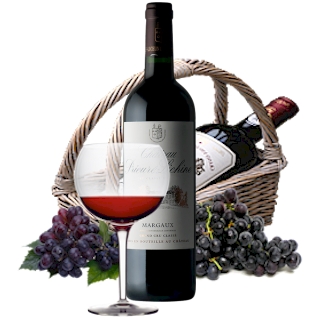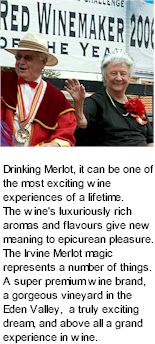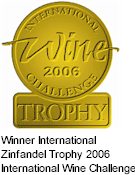


Irvine is a family name and a family business - the name at the front of the years of hard work and dedication put in by all at Springhill in the Eden Valley, Jim and Marjorie Irvine and winemaker daughter Joanne.

Never in 1959 did James Irvine ever think he would one day own his own property in the ranges above the Eden Valley of South Australia. At that time he was with Thomas Hardy & Sons and was responsible for the purchase of grapes from the Eden Valley area for the production of the famous Siegersdorf Riesling. The area greatly impressed the young Jim Irvine, and he dreamed of some day being able to plant his own vineyard there.
Right from the start quality in all aspects of viticulture, winemaking and packaging has been the driving force, and the Irvine Merlots are already recognised the world over as being equal to the finest produced anywhere in Australia. Total dedication to the task and a willingness to fully age wines in Irvines' own maturation system together with a serious and determined approach, has resulted in wines of extraordinary style, depth of flavour, and intensity of varietal character seldom seen.
Hans Irvine (a distant relative) established Great Western, Australia's greatest sparkling wine cellars in 1888. His philosophy to provide sparkling wines and table wines of the highest quality and prestige style was proven and now another Irvine carries this philosophy on in a different way. This Irvine approach has not come overnight. Winemaking experience covers nearly forty years, with Hardy's Siegersdorf, Krondorf, Normans and Lakewood, each having sparkling wine and premium table wine production involved in their overall winemaking.

The Irvine Winery's Springhill vineyard has its own terroir - its location, climate, the Barossan culture plus the modern Australian winemaker interpretation of classic styles, pristine varietal expression, and rarity, and we have an understanding of just what this means. Springhill is composed of acid soils, gravels mostly, and later ripening fruit resultant from cooler autumn temperatures.
The good natural rainfall, the high level drainage and the tough growing conditions all come together to give this terroir or regionality. With these then comes the Baronssan character of the vineyard staff. Their care, understanding, love of vineyards and high work ethic bonds together the natural elements and truly completes Springhill terroir. The wines reflect this most clearly in Grand Merlot, Pinot Gris, Zinfandel, Chardonnay and, when on their own, the Eden Crest Merlot portions. Long flavours, multiple nuances, slightly tighter finish, longevity also comes from these conditions of terroir.
Environmentally Springhill vineyard is operated on the minimal input system (MIP) where no spraying takes place as a routine program. Insect and disease monitoring picks up any problems and this then is assessed with no action unless absolutely necessary and then only on a minimum basis.
James Irvine has been winemaker, wine stylist, project manager, wine consultant and marketer of wine at senior levels. He feels that this offers more understanding of the consumers' needs and a wider appreciation of the responsibilities that the winemaker must have towards the consumer. As can be seen from his CV he has been involved in industry matters as well.
